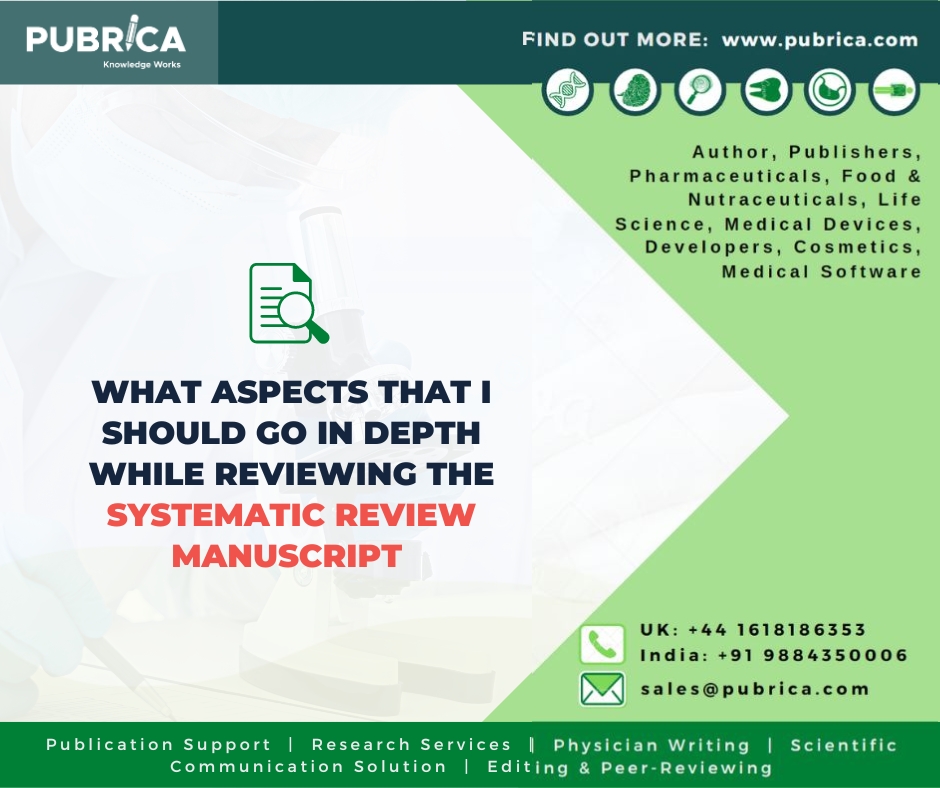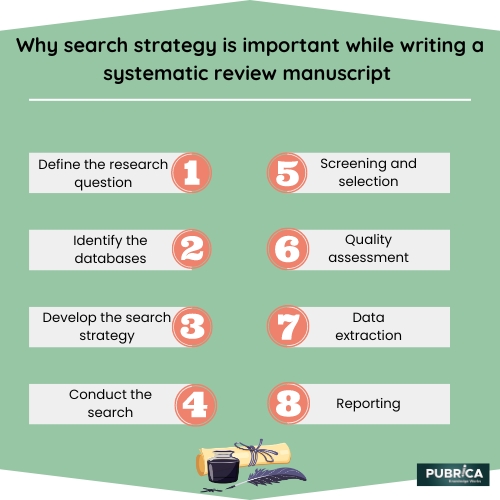
How to Develop a search strategy for a systematic review
May 12, 2023
What aspects should I go into depth while reviewing the Systematic Review Manuscript?
May 20, 2023In brief
A systematic review’s manuscript‘s purpose is to find relevant research. Errors in electronic database search strategies can reduce recollection, resulting in missing research and inadequate findings. The search approach must be totally apparent to readers in order to identify these problems.
Introduction
The search strategy is a crucial component of a systematic review manuscript as it determines the scope and comprehensiveness of the study. A well-designed search strategy is important because it ensures that all relevant studies are identified and that the study is not biased towards certain types of research papers or outcomes. A comprehensive search strategy also increases the reproducibility and transparency of the manuscript.
Here are some measures to consider when designing a search strategy for a systematic review:
- Define the research question: Start by clearly defining the research question and identifying the key concepts and terms that are relevant to the question.
- Identify the databases: Determine which databases are most appropriate for the research question and whether additional sources such as grey literature, conference proceedings or clinical trial systematic review registers must be searched.
- Develop the search strategy: Develop a search strategy that includes both controlled vocabulary and text words and that is tailored to each database. Use truncation, wildcards and Boolean operators to maximize the search.
- Conduct the search: Conduct the search in each database, record the number of hits, and document the search strategy for transparency.
- Screening and selection: Screen the best titles for research papers and abstracts of the search results to identify potentially relevant studies, then screen the full text of these studies to determine eligibility for inclusion in the systematic review manuscript.
- Quality assessment: Assess the quality of the included studies using appropriate tools and consider the risk of bias in the studies.

- Data extraction: Extract relevant data from the included studies, including study design, population characteristics, interventions, outcomes, and results.
- Reporting: Document the search strategy in detail and report it according to the Preferred Reporting Items for Systematic Reviews and Meta-Analyses (PRISMA) guidelines.
Overall, a well-designed search strategy is essential for a rigorous and comprehensive systematic review manuscript and can significantly impact the quality and relevance of the results.
Conclusion
Search strategy reporting in systematic review manuscripts is crucial for assessing review quality, repeatability, and updating. According to our findings, the Cochrane recommendations for reporting electronic database search strategies are not being followed regularly. There are various reasons why explicit search strategy reporting is important: It acts as a tool for evaluating the quality of a search, ensuring a fair assessment of the reliability and methodology of a review; it allows replication and consistency in the research approach to be used when updating a review; and It may be used to construct search techniques for reviews on related topics, supporting the production of common knowledge.
About Pubrica
Pubrica’s research and writing teams provide scientific and medical research papers that may be useful resources for authors and practitioners. Pubrica medical writers assist you in creating and rewriting the introduction by informing the reader of the deficiencies of the selected field of research. Our experts understand the sequence in which the limited subject, problem, and background are followed by the targeted region in which the hypothesis is proposed.
References
Yoshii A, Plaut DA, McGraw KA, Anderson MJ, Wellik KE. Analysis of the reporting of search strategies in Cochrane systematic reviews. J Med Libr Assoc. 2009 Jan;97(1):21-9. doi: 10.3163/1536-5050.97.1.004. PMID: 19158999; PMCID: PMC2605027.



